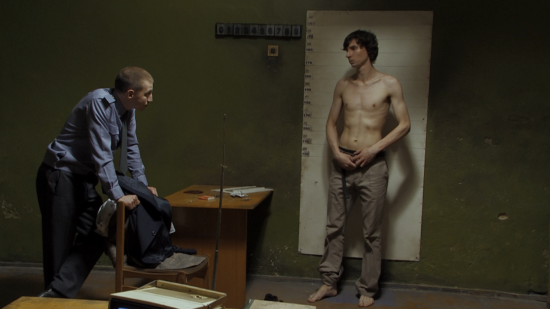Deimantas Narkevičius

Deimantas Narkevičius “Restricted Sensation” (2011). Feature video film, DCP, 16:9. Color, 5.1 sound. Lithuanian, Russian and Polish spoken. Duration 45 min. 26 sec.
Deimantas Narkevičius (born 1964) is one of the most prominent filmmakers in the visual arts context, both in Lithuania and internationally. He also creates sound and sculpture installations and photographs. The memory of the utopia of modernism from the present-day perspective is a central theme in his work. He uses history as a living material to create subjective narratives, and questions whether objective documentary is at all possible. Narkevičius often uses cine film because of its material properties’ capacity to enhance the desired illusion of an imagined time.
The specific cultural legacy of local Soviet modernism and its interpretation are key to his work; in his films, he uses a variety of found footage, such as propaganda documentary, which formerly shaped the collective memory, as well as narratives from film and literature rooted in the post-Soviet consciousness, and the work of other artists. In this way, he brings the narrative closer to subjective experience, against the backdrop of a traumatic history. In one of his recent works, 3D video installation ‘Stains and Scratches’ (2017), which was awarded the Grand Prize at the Oberhausen International Short Film Festival (2018), cine film as a material becomes inseparable from the images it contains. A digitally scanned file is both the image and the surface of the chemically developed film. This duality has motivated Narkevičius to create what he calls “a stereoscopic sculptural illusion”. In 1971, students of the Vilnius Art Institute presented a staging of ‘Jesus Christ Superstar’, in which they recreated the rock opera by simply listening to the recently released vinyl record that had circulated in the Vilnius underground scene of the time. The digitalisation and 3D projection of this silent black and white footage is a way of imagining this contradictory and inconsistent time. Students’ political ambitions intertwine with the shared euphoria in the times of strict information regulation and silencing.
Narkevičius represented Lithuania at the 49th Venice Biennale in 2001. Besides many other exhibitions, he received invitations to exhibit at Manifesta (1998) and the contemporary art biennials in Busan (2004), Gwangju (2006), Istanbul (2009), and São Paulo (2010); he also participated in the Skulptur Projekte Münster (2007). His comprehensive solo exhibitions have been presented at the Museo Nacional Centro De Arte Reina Sofía in Madrid, Kunsthalle in Bern, Van Abbemuseum in Eindhoven (the Netherlands), Kunstmuseum Brandts in Odense (Denmark), and the Baltic Centre for Contemporary Art in Gateshead (the UK). Programmes of his films have been screened at the Centre Pompidou in Paris, at the short film festivals of Oberhaus and Winterthur, and the British Film Institute in London. Deimantas Narkevičius has been awarded the prestigious Vincent van Gogh Biennial Award for Contemporary Art in Europe, the Lithuanian National Culture and Art Prize (2008), and the Grand Prize at the Oberhausen International Short Film Festival (2018). His works have been included in the collections at Tate Modern in London, Centre Pompidou in Paris, Moderna Museum in Stokholm, and other public and private European art collections.
The artist is represented by:
gb agency (Paris): www.gbagency.fr
Galerie Barbara Weiss (Berlin): www.galeriebarbaraweiss.de
Maureen Paley (London): www.maureenpaley.com